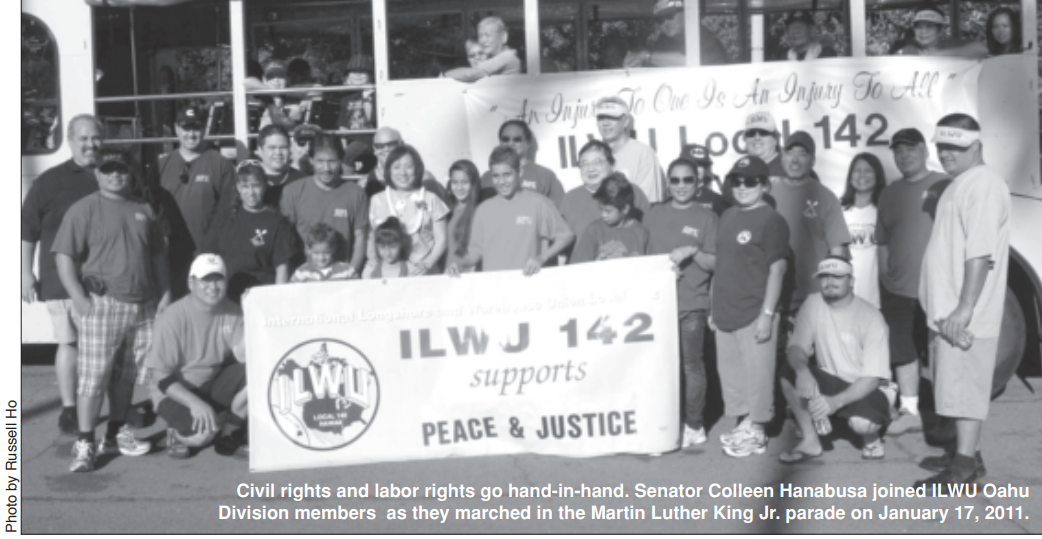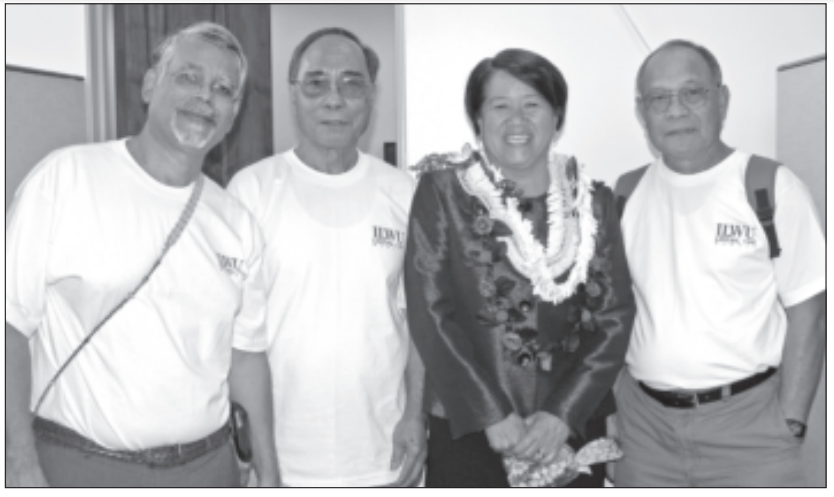
Hawaii celebrated the Martin Luther King Day holiday with a parade through Waikiki and a rally at Kapiolani Park in Honolulu. The holiday honors Martin Luther King, Jr., a Baptist minister from Montgomery, Alabama, who was one of the leaders of the civil rights movement to end discrimination against Black Americans, and who spoke eloquently against poverty and the US war in Vietnam. King was assassinated on April 4, 1968, in Memphis, Tennessee, where we was supporting the city’s sanitation worker’s union for a fair contract.
King was a strong supporter of unions and their goal of creating a better life for working people In a speech before the AFL-CIO Convention in December 1961, King said the needs of Black Amercians and labor were identical:
“Negroes are almost entirely a working people. There are pitifully few Negro millionaires, and few Negro employers. Our needs are identical with labor’s needs—decent wages, fair working conditions, livable housing, old age security, health and welfare measures, conditions in which families can grow, have education for their children and respect in the community. That is why Negroes support labor’s demands and fight laws which curb labor. That is why the labor-hater and labor-baiter is virtually always a twin-headed creature spewing anti-Negro epithets from one mouth and anti-labor propaganda from the other mouth.”
On April 3, 1968, the day before he was assassinated, King spoke at a rally of Memphis sanitation workers who collected the city’s rubbish:
You are demanding that this city will respect the dignity of labor. So often we overlook the work and the significance of those who are not in professional jobs, of those who are not in the so-called big jobs. But let me say to you tonight that whenever you are engaged in work that serves humanity and is for the building of humanity, it has dignity and it has worth.
2011 ILWU Legislative priorities
Eight high priority issues will guide the work of the ILWU during the 2011 Legislative Session.
1. Worker Retention. The union will continue to work for legislation to protect jobs and employment when companies are purchased, ownership or management changes, a lease is transferred, or assets are sold or transferred and the business operation continues in a similar manner as under the previous owner or management.
2. Workers Compensation. The ILWU will work to maintain the existing “presumption clause” in the Workers’ Compensation law which “presumes” an injury is work related unless the employer can prove the injury or illness is not because of their work.
The union will continue to support improvements in the law requiring timely payments of benefits, prevent benefits from being cut while a claim is being investigated or under appeal, and require insurance companies to pay the cost of an appeal when they lose.
The ILWU will work to address the problem of physicians declining to treat workers compensations cases because of cost or paperwork. The union will also work to set up panels of providers where the injured worker and the insurance company can mutually select a physician to perform an Independent Medical Examination of the injured worker.

Kauai representatives visit lawmakers on the opening day of the State Legislature, January 19, 2011. (L-r) Kauai Division Director Michael Machado, retired Division Director Alfred Castillo, newly elected House District 16 Representative Dee Morikawa, and retired Business Agent Jesus Guirao.
3. Strong support for harbor development throughout the State of Hawaii, based on the priorities established by the Hawaii Harbor Users Group. Waterfront development must prioritize the need to provide for growing manifested cargo operations and not compromise safe working conditions for the employees.
4. Strong support for senior programs.
5. Oppose the State from taking the county share of the Transient Accommodations Tax (TAT).
6. Oppose the State from taking the rail tax of 0.5% added to the general excise tax for the City and County of Honolulu.
7. Amend the Dislocated Workers Act to apply to all employers and require the Department of Labor and Industrial Relations to enforce the law and assess penalties against employers for violations.
8. Require labeling of frozen and previously frozen bread produced outside of Hawaii to inform consumers and to promote fresh-baked Hawaii products.
